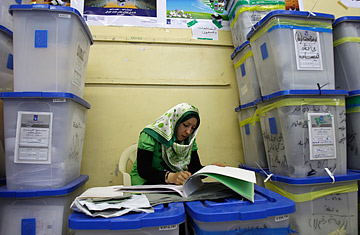
An official registers the serial numbers on locks used for parliamentary-election ballot boxes at a counting center in Baghdad
The great hope for Iraq's March 7 national elections was that could they could restore faith in the democratic process, and set a new tone of national purpose in Baghdad's corridors of power. The great fear was that without clear winners and losers, the elections could produce months of bitter infighting, heightening the sectarian and ethnic tensions behind the civil war that broke out after the 2005 election. And 10 days after the polls closed, with partial results tricking in and about 80% of the vote counted, Iraq appears destined for more trouble.
The results currently are so close — with current Prime Minister Nouri al-Maliki neck-and-neck with former Prime Minister Ayad Allawi, and the movement of radical Shi'ite cleric Moqtada al-Sadr emerging with what may be a kingmaker's share of the vote — that Iraq could see months of deadlock that will do little to boost the country's faith in its politicians. Moreover, the election results have broken down along depressingly familiar sectarian and the ethnic fault lines — although with the authority of the traditional ethnic and sectarian parties weakening in a manner that will further complicate efforts to form a government.
The election campaign had raised hopes that Iraqis were ready to move beyond the chaos and violence that had plagued their country since the ouster of Saddam Hussein. The major political blocs appeared to have recognized that no single ethnic group or sect could govern peacefully and effectively without making alliances across traditional fault lines. The big parties put forward diverse coalitions preaching national unity, even if each retained a core identity well known to voters: Maliki's State of Law coalition ran on a law-and-order platform but drew primarily from a moderate Shi'ite base; Allawi's Iraqiya ran on a similar platform but ran strongest among Sunnis. But even if Iraq's politicians pretended to have outgrown identity politics, voters either didn't get the memo or saw through the spin, and voted largely by ethnicity and sect. Allawi won in majority Sunni areas; Maliki won his seats in majority in Shi'ite areas; and Kurds voted for Kurds.
Maliki took a risk by separating himself from the Shi'ite Iraqi National Alliance (INA) that had propelled him to power, but struggled nonetheless to present himself as a truly national figure. While he had cracked down hard against terrorism and militias, especially the radical Shi'ite followers of Moqtada al Sadr, his support for a government de-Ba'athification committee that banned 500 parliamentary candidates — including many key Sunni politicians — a few weeks before the election appears to have helped fuel Sunni suspicion that he harbored a sectarian agenda. Maliki's troubles have been a boon to the Sadrists, who entered the election as the junior partner in the INA. But the Sadrists appear to be among the big winners of the elections and stand to win as many as 40 seats out of the 325 in the national assembly, potentially making their support crucial for any would-be prime minister. Still smarting from Maliki's crackdown against their militia in Basra in 2008, the Sadrists have refused to form a government with him. If they maintain that position, Allawi would be an obvious partner, but it remains to be seen whether Allawi's coalition would maintain its Sunni backing if he allied himself with a faction viewed as having been intimately involved in sectarian death squads.
Another major stumbling block in the negotiations to form a government will be the oil-rich city of Kirkuk and the other disputed areas in northern Iraq. In a surprising turnaround, the Kurdish parties appear to have lost Kirkuk by a slim margin to Allawi's list, which has taken a hard line against Kurdish claims to the city. Since Maliki — whose current government was installed with Kurdish support, but dragged its feet on Kurdish claims to Kirkuk — now has fewer possible partners to form a government, he may find himself more dependent on them than ever. And that would put him under greater pressure to deliver them Kirkuk, despite the risk of spurring further conflict.
Allawi currently leads Maliki by about 9,000 votes. While either candidate could yet pull out in front, the result has not only denied any one bloc the ability to form a government on its own, but may also have failed to give any of the contenders a clear mandate to take the lead in post-election coalition negotiations. Meanwhile, the slow vote counting is doing little to inspire confidence, with each announcement of partial results sparking another round of posturing, jockeying, and rumors, one of which held that Maliki had been shot in the leg. All the major coalitions have complained of electoral fraud, though most Western observers say that for now there appears to be little evidence of serious vote-rigging. Still, Ahmed Chalabi, the former Pentagon favorite now aligned with the Sadrists, has demanded that all allegations be thoroughly investigated before final result are published. At this rate, it may be months before Iraq even has a definitive result, let alone a government.
